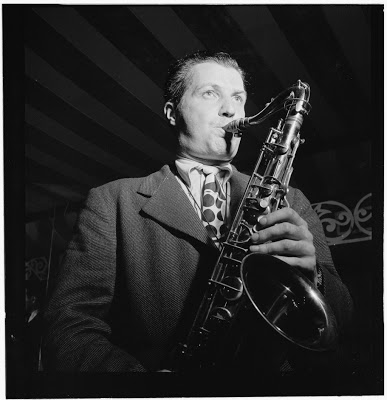Charlie Barnet, October 26, 1913 – September 4, 1993 was a unique man in many ways. Barnet, one of few jazzmen born millionaires, was an occasional playboy throughout his entire life. He had a lot of ex-wives, and other interesting anecdotes. Barnet was one of few white swing era big band leaders to openly embrace Duke Ellington’s music (he also greatly admired Count Basie). Barnet was an early pioneer in the creation of integrated bands, starting as early as 1935. Barnet, who was primarily a tenor player and developed a unique sound in the style of Coleman Hawkins, was also an effective imitator of Johnny Hodges’ alto. He was also the only soprano player (other Than Sidney Bechet). Charlie Barnet’s contribution to jazz was limited to a few years (1939-1949). His family wanted him to become a lawyer but he became a professional musician at the age of 16. Ironically, his business career earned him more than he would have made in business. Barnet arrived in New York in December 1932. He started leading bands that recorded the next year. However, his career was very erratic until 1939. While many of Barnet’s first records are worth listening to, some are very commercial. He tried to find a niche. Best is his appearance as a sideman on a 1934 Red Norvo date, which also features Teddy Wilson and Artie Shaw. Charlie Barnet became a household name in 1939 with his hit song “Cherokee” as well as a successful run at The Famous Door in New York. Along with Bobby Burnet, the great trumpeter, such sidemen as guitarist Bus Etri, drummer Cliff Leeman, singers Lena Horne and Francis Wayne; pianist Dodo Martosa; clarinetist Buddy DeFranco, guitarist Barney Kessel, and even trumpeter Roy Eldridge, Barnet was a household name. Barnet’s Decca recordings from 1942-1946, when he was at his peak of popularity (when his orchestra could sometimes play a close imitation to Ellington’s), were also very interesting. “Skyliner”, his Decca recording, was a top-seller. Barnet began to look towards bop by 1947. Clark Terry was his star trumpeter in that year. In 1949, his screaming trumpet section consisted of Maynard Ferguson and Doc Severinsen. Rolf Ericson and Ray Wetzel were also part of the band. Barnet lost interest in the band and disbanded it near the end 1949. Charlie Barnet was semi-retired for the rest of his life. He occasionally led big bands that were influenced by swing during brief tours and appearances. His last recording was in 1966. Text contributed by users is available under Creative Commons By–SA License. It may also be available under GNU FDL.
